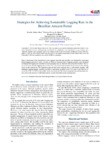Use este identificador para citar ou linkar para este item:
http://www.alice.cnptia.embrapa.br/alice/handle/doc/984411| Título: | Strategies for achieving sustainable logging rate in the Brazilian Amazon Forest. |
| Autoria: | BRAZ, E. M.  MATTOS, P. P. de   OLIVEIRA, M. F.   BASSO, R. O.   |
| Afiliação: | EVALDO MUNOZ BRAZ, CNPF; PATRICIA POVOA DE MATTOS, CNPF; MARIANA FERRAZ OLIVEIRA, Mestranda UPFR; RENATO OLIVIR BASSO, Elabore Projetos e Consultoria Florestal. |
| Ano de publicação: | 2014 |
| Referência: | Open Journal of Forestry, v. 4, n. 2, p. 100-105, 2014. |
| Conteúdo: | Data of increment of the remnant trees after logging, ingrowth and mortality was obtained by assessment before logging and after 6 years, two sites of 50 ha, in Amazon forest. Logging scenarios were simulated to identify the logging rate potential for each studying sites, by diameter class projection method. The cy- cle of 35 years and the logging rate of 30 m3?ha?1 exceed the time required for recovery in the primary forest, in the studied site. The simulation showed that in the studying area, a well-planned logging, with minimum logging damage would be possible to implement an initial cycle of 25 years to the forest to re- cover 30 m3?ha?1, if 50% of the timber stock were reserved. The forest increment, beyond important fac- tors such as the increase of individual species, is quite dependent on the remnant trees. |
| Palavras-chave: | Estrutura diamétrica Regeneração florestal Crescimento florestal |
| Tipo do material: | Artigo de periódico |
| Acesso: | openAccess |
| Aparece nas coleções: | Artigo em periódico indexado (CNPF)  |
Arquivos associados a este item:
| Arquivo | Descrição | Tamanho | Formato | |
|---|---|---|---|---|
| 2014APIStrategiesAchieving.pdf | 203,08 kB | Adobe PDF |  Visualizar/Abrir |









